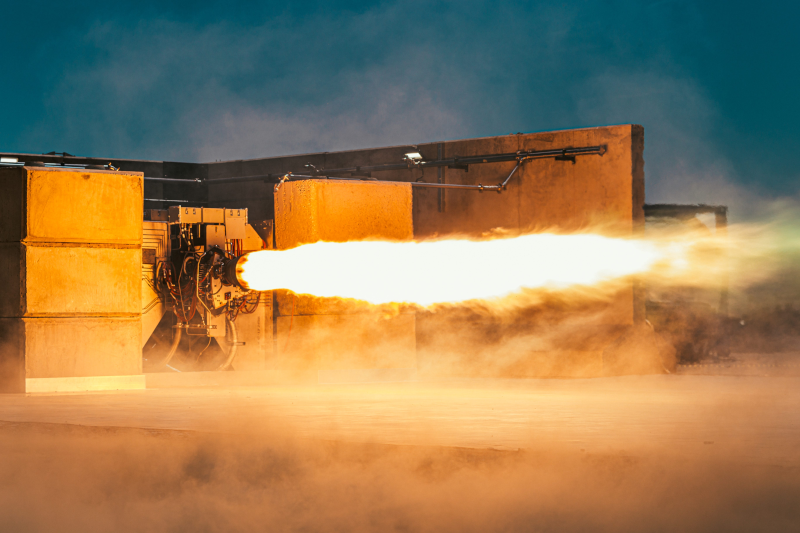There is a reason building a rocket engine is harder than most things you want to build. If you are building, say, a car, your goal is to not have it explode. If you are building a bomb, you want that to explode. But a rocket engine needs to explode just enough and not a bit more. That’s tough, as [Ryan Kuhn] discovered. He’s behind ABL’s E2 rocket, a LOX/kerosene engine for small vehicle launches. You can catch a video of the engine’s qualification tests below.
[Ryan] shares many of the problems encountered from many problems, each requiring finetuning of the design. True, there are plenty of publicly available NASA documents about what works and doesn’t work for rocket engines, but that can only take you so far. You can’t learn to bowl by reading about bowling, and you can’t design a successful rocket on paper just by reading about what others have done.
The post is long, but it is a rare glimpse into what goes into a major engineering project like this. [Ryan] started with a blank page, and the team created almost everything outside of some commodity parts, such as bearings, seals, and sensors. They even built all their own test infrastructure and software.
So, while you might never get the chance to build a rocket engine on this scale, just looking inside the process is fascinating. Who knows? It might help you with your next model rocket project.
Even starting a rocket engine can be a challenge. Today, we have many interesting fabrication techniques, but engines from the Shuttle and Apollo eras had to resort to some interesting tricks to get the precision parts they needed.

















And at the other end of the scale is Homer Hickam’s Rocket boys aka October Sky, (not to be confused by other more recent things of the same names). Good book, decent movie.
“The book is always better than the movie”*
*2001: A Space Odyssey is an exception.
Arthur Clarke was a better engineer than writer. October sky is great in both formats though, one of my faves
Nice for a quick barbecue.
I would love to have also the sound, it ain’t in space yet.
No.
A rocket engine or solid rocket motor does not “explode just enough.” Neither is it a controlled explosion, as it has been called by some. It doesn’t explode at all. It’s combustion. Combustion under highly controlled conditions. Combustion that is designed to create a certain pressure in the combustion chamber at a certain time, generating desired thrust.
When you hear “Throttle up” during a liquid-propellant rocket launch, fuel and oxidizer are being pumped into the chamber more rapidly, generating higher chamber pressure and more thrust. Of course in a solid motor the amount of propellant is fixed; a particular thrust profile is generated by the geometry of the propellant.
Can you imagine someone lighting a match and saying “Wow, look at this explosion!” (Actually BATFE classifies matches as explosives, but someone once said that calling a tail a leg doesn’t make the name fit.) Yet the match and rocket propellants in space boosters involve essentially the same type of reaction. Fuel, oxidizer, and additives burning at a controlled rate.
Yes, a rocket *can* explode—but that’s a malfunction, just as the explosion of an automobile engine is a malfunction.
Fun fact: typical space booster solid propellant burns quite slowly, on the order of 10 mm/s. That’s why all that open space was needed inside the Shuttle SRB. A lot of burning surface was needed to generate enough pressure for the desired thrust.
You’re right, explosion is by (dictionary) definition “a violent shattering or blowing apart of something, as is caused by a bomb”.
There is a new type of engine, rotating detonation engine. So while it doesn’t explode in normal operation, it now actually detonates instead of simply combusting.
Most dictionaries list multiple definitions for explosion. From Merriam Webster I found “to undergo a rapid chemical or nuclear reaction with the production of noise, heat, and violent expansion of gases”. A rocket engine would seem to fit that definition pretty well.
Yes a rocket’s fuel combusts but most explosions that we think of are the result of combustion. Prfesser seems to want to use “explosion” in such a way that “sustained explosion” or “controlled explosion” are self contradictory. If that’s how you prefer to use the term fine but others aren’t necessarily wrong for using it differently.
Nobody would compare a rocket engine to a match and it’s just fine for idiomatic use
Explosives detonate.
Detonation is a type of combustion involving a supersonic exothermic front accelerating through a medium that eventually drives a shock front propagating directly in front of it. Detonations propagate supersonically through shock waves with speeds in the range of 1 km/sec and differ from deflagrations which have subsonic flame speeds in the range of 1 m/sec. From wiki
Not all explosives detonate.
Low explosives burn very rapidly, and explosion occurs only when contained.
You’re thinking only of high explosives.
Interesting read, I am no mechanical engineer and enjoyed it.
Anything that burns is called flame propogation. In an explosion there is flame propogation in the milliseconds. In a camp fire the flame propogation can be measured in minutes or hours. It’s all about how fast the flame moves.
While others have already covered the fact that normal rockets are just like cars in that detonation in the engine is a big problem, it’s worth pointing out that a *mixture* of many of the fuels and oxidizers used in rockets can be explosive. They burn properly in a running engine, but detonate if they puddle before being set off by something. The same thing can happen with mixtures of one or both of the components and a third unlucky substance, such as grease or the wrong metal or some corrosion or residue, depending which rocket fuels and oxidizers we’re specifically looking at. Usually in those cases it’s the oxidizer that’s the problem, or it’s an angrier propellant mix and probably hypergolic. Everyday hydrocarbons like kerosene may not be as bad on their own, nor is liquid oxygen anywhere near as bad as the other oxidizers, but it still isn’t something I would stand near if spilled. You can get a (supposedly) stronger detonation than dynamite from walking on asphalt if it’s been soaked; look up Oxyliquit.
This partly shows the major problem with “private” spaceflight, with government funded “development”.
If your company wants to foot the entire development cost for a platform,,then harge for it’s use, fine I guess. I don’t have to like it. But at least it’s fair in principle.
If you submit a bid to develop a platform, are funded, then you charge for the service AND keep all the IP private?
Heck no.
“The People” paid for that.
We own it.
Private spaceflight only exists BECAUSE they had publicly available “shoulders” to stand on.
Yese guys shouldn’t HAVE to do it from scratch, because the “competition” shouldn’t be allowed to keep secrets of publicly funded projects.